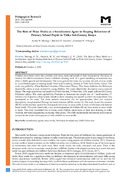| dc.contributor.author | Mwangi, Esther W. | |
| dc.contributor.author | Gachahi, Michael W. | |
| dc.contributor.author | Ndung’u, Catherine W. | |
| dc.date.accessioned | 2019-10-15T11:42:55Z | |
| dc.date.available | 2019-10-15T11:42:55Z | |
| dc.date.issued | 2019-10 | |
| dc.identifier.citation | Pedagogical Research, 2019, 4(4), em0048 | en_US |
| dc.identifier.issn | 2468-4929 | |
| dc.identifier.uri | https://karuspace.karu.ac.ke/handle/20.500.12092/2313 | |
| dc.description | https://doi.org/10.29333/pr/5950 | en_US |
| dc.description.abstract | Children learn better when they socialise with items, tools and people in their environment. Provision of creative fun-filled environment boosts children’s learning. Lack of a good socialising environment may affect a child’s growth and development. The main goal of this study was to assess the role of mass media as a socialisation agent in shaping pupils’ behaviour in primary schools in Thika Sub-County, Kenya. The study was guided by Albert Bandura’s Imitative Observation Theory. This theory indicates that behaviour depicted by others is easily imitated by young children. The study adopted the descriptive survey research design. The target population comprised of 69 head teachers, 570 teachers, 3256 pupils and one Sub County
Education officer. The study applied Gay Principle to determine the sample size of 7 head teachers, 57 teachers and 35 primary school pupils. Simple random sampling was applied to select the respondents who participated in the study. The main research instrument was the questionnaire. Data was analysed descriptively using Statistical Package for Social Sciences (SPSS) version 20. The study found that majority (88.0%) of the teachers agreed that their pupils had access to mass media in form of television and internet based media. The study noted only a very small proportion of children did not have access to mass media
at home. The study concluded that at home, most children spend most of their time listening to radio, watching television programmes, or playing video games. The study recommends that parents must exercise control on the choice and exposure of their children to mass media. | en_US |
| dc.language.iso | en | en_US |
| dc.publisher | Pedagogical Research | en_US |
| dc.subject | socialisation agents | en_US |
| dc.subject | mass media | en_US |
| dc.subject | behaviour development | en_US |
| dc.subject | child’s behaviour | en_US |
| dc.title | The Role of Mass Media as a Socialisation Agent in Shaping Behaviour of Primary School Pupils in Thika Sub-County, Kenya | en_US |
| dc.type | Article | en_US |
